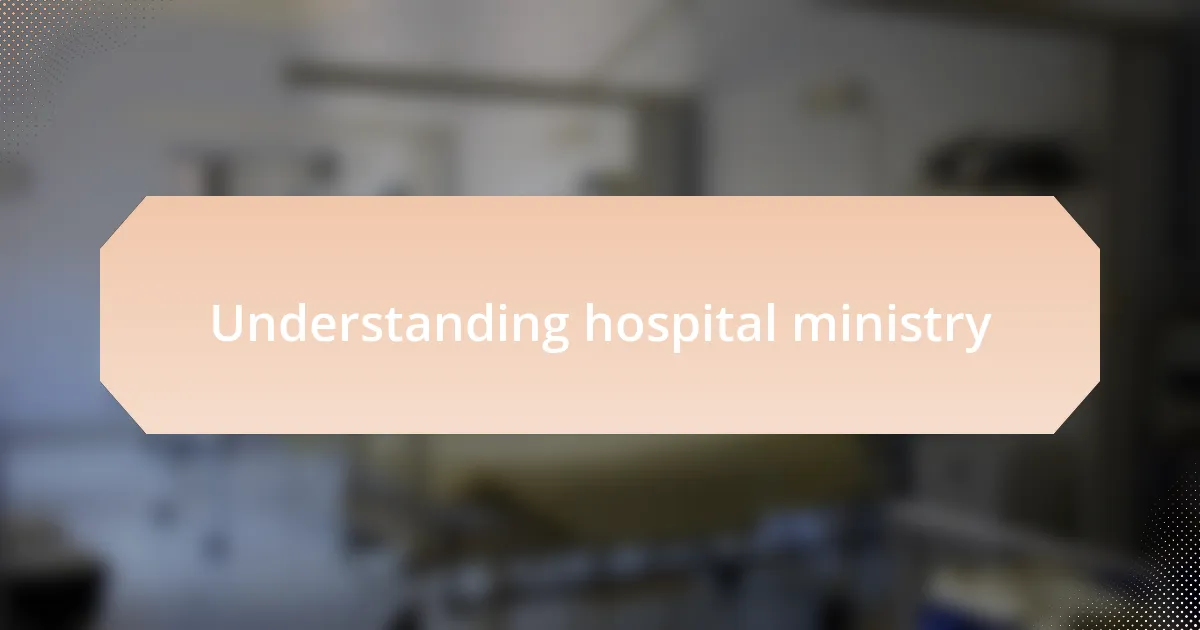Key takeaways:
- Hospital ministry emphasizes the importance of emotional and spiritual support for patients and families, highlighting the transformative power of compassion.
- Effective leadership in hospital settings fosters collaboration and trust, enabling teams to navigate high-stress situations, as well as inspiring hope and resilience.
- Personal growth emerges through service, with lessons in empathy, adaptability, and the value of being present for others in times of need.
- Authentic leadership involves listening, humility, and empowering others, rather than simply directing tasks or providing solutions.

Understanding hospital ministry
Hospital ministry is a vital aspect of healthcare, providing spiritual support to patients and their families during some of the toughest times in life. I often reflect on the way a simple act of compassion can ease a person’s fear. How powerful is it, really, to sit quietly with someone who feels utterly alone, offering just your presence, your empathy?
In my experience, the connection formed within these hospital walls transcends physical ailments. There have been moments when I’ve listened to a mother recount her fears about her child’s surgery, tears streaming down her face. I could feel her pain deeply, and I realized that being there for her was as important as any treatment her child would receive. It’s these instances that show just how crucial emotional support is in the healing process.
Moreover, the work of hospital ministry is not only about providing solace; it also involves fostering a sense of community among the staff, volunteers, and patients. I recall a day when we gathered for a small service in the hospital chapel, and the collective energy was palpable. It was a reminder that everyone, regardless of their circumstances, shares a common humanity. Isn’t it incredible to think about how interconnected our lives are, especially in these vulnerable moments?

Importance of leadership skills
Leadership skills are crucial in hospital ministry because they enable us to navigate complex situations with grace and empathy. I remember a time when a team was faced with a particularly challenging case—the patient’s family was distraught and needed someone to guide them through the emotional turmoil. In that moment, I felt the weight of responsibility, realizing that demonstrating strong leadership could foster trust and hope.
Additionally, effective leadership cultivates collaboration within the team, which is fundamental in such a high-stress environment. One day, during a shift, we faced a sudden influx of patients. I stepped up to coordinate the response, encouraging everyone to use their unique skills. It was awe-inspiring to witness how our collective strengths came together, creating a supportive network that not only helped the patients but also energized the entire team.
Furthermore, leadership in hospital ministry is about setting an example and inspiring others. I’ve found that when I approach my work with passion and commitment, it has a ripple effect on those around me. Are we not all drawn to the fire of someone who genuinely cares? Witnessing others step into their roles with renewed vigor after an uplifting experience reminds me of the lasting impact strong leadership can have, not just on the immediate circumstances, but also on morale and community.

How service fosters personal growth
Engaging in service has profoundly influenced my personal growth, pushing me beyond my comfort zone. I recall volunteering with a group that supported families during hospital stays. Initially, I felt overwhelmed—how could I truly make a difference? Yet, as I learned to listen to their stories, I realized that simply being present was transformative for both them and me. It taught me that personal growth often stems from vulnerability and the willingness to connect with others.
Service also cultivates resilience. There were times when it felt emotionally exhausting to witness suffering and uncertainty. I remember one particularly tough day, when a child I had bonded with passed away. Instead of retreating into sadness, I found strength in sharing that grief with others in the team. We leaned on one another, reminding ourselves why we were committed to this work. Through such experiences, I learned that facing hardships together can be a powerful catalyst for growth.
Moreover, serving others ignites a passion for learning. Every interaction has offered me the chance to expand my understanding of empathy and compassion. I often ask myself, what have I learned today from those I serve? Whether it’s discovering a new perspective from a patient’s story or grasping the intricacies of teamwork during a crisis, these insights shape my approach to leadership. This ongoing journey of learning through service continues to be one of the most rewarding aspects of my life.

My experiences in hospital ministry
During my time in hospital ministry, I encountered countless moments that pushed me to reflect on my own values. I vividly remember a late-night shift where I sat with an elderly patient who was facing loneliness. As we shared stories, I felt a profound connection. In that moment, I understood that leadership isn’t just about guiding others but also about recognizing their humanity and contributing to their healing process.
I also learned the value of teamwork firsthand while coordinating a support group for families. We faced challenges, from scheduling conflicts to emotional burdens. I recall one rainy afternoon when our plans fell apart just hours before the meeting. Instead of panicking, my team and I quickly devised a new approach, turning the setback into a more intimate discussion. It’s experiences like this that highlighted the importance of adaptability and collaboration in leadership.
Moreover, I’ve often found that the most profound lessons come from unexpected sources. Once, a young boy, newly diagnosed with a chronic condition, jokingly asked me if I was his new superhero. I laughed but was struck by his resilience. His simple yet powerful spirit nudged me to think: What does it truly mean to lead others? In those moments, I realized that fostering courage in others is as vital as guiding them; true leadership is about empowering those we serve to find their own strength.

Key leadership skills developed
Throughout my journey in hospital ministry, I’ve developed a keen sense of empathy, which is crucial for effective leadership. I fondly recall a time when I held a hand of a nervous parent waiting for their child’s surgery. In that deeply vulnerable moment, I realized that to lead effectively, one must connect with others on an emotional level. How can we provide support without understanding their fears? This understanding not only builds trust but also fosters a deeper level of communication, allowing for more compassionate care.
Communication has been another significant skill I honed. During a particularly chaotic day, I found myself stepping up during a team discussion about patient needs. Recognizing the varying perspectives from the staff, I facilitated a brainstorming session that encouraged everyone to share their insights. It struck me that a good leader listens as much as they speak. By encouraging open dialogue, we embraced diverse ideas that ultimately enhanced our service delivery. Isn’t it fascinating how empowering others can lead to innovative solutions?
Lastly, I gained a profound appreciation for resilience. There was one harrowing shift filled with emotional turmoil, where we faced multiple crises simultaneously. In those moments, I often turned to my colleagues, sharing experiences and finding strength in our collective spirit. Observing their determination inspired me to lead by example, demonstrating that perseverance in tough times is what uplifts us all. In every challenge, I learned that true leadership shines brightest in adversity—how often do we find our greatest strengths in moments of struggle?

Reflections on leadership and service
Reflecting on leadership through service, I’ve encountered the transformative power of humility. I vividly recall volunteering during a health fair where I was tasked with coordinating a team of passionate volunteers. Instead of dictating tasks, I encouraged everyone to share their ideas, which revealed insights I had never considered. It hit me then: authentic leadership is not about being the loudest voice but about fostering an environment where everyone feels valued. Have you experienced a moment where listening transformed your understanding?
Another poignant moment came when I had to assist a terminally ill patient and their family. Sitting with them in their time of need opened my eyes to the importance of presence in leadership. I wasn’t there to fix everything; instead, I was there to simply be, offering solace through compassion. How often do we think that leadership means having all the answers when, in reality, sometimes the greatest gift we can provide is our undivided attention?
Furthermore, I learned the significance of adaptability. During an unexpected crisis, we had to reorganize our resources rapidly, and I found myself guiding the team through uncertainty. I realized that great leaders are like seasoned sailors, adjusting their sails to navigate turbulent waters rather than resisting the storm. In those frantic moments, I understand that flexibility not only ensures survival but also inspires confidence in others. Reflecting on these experiences, I can see how leadership and service are intertwined in ways that continually shape who I am.